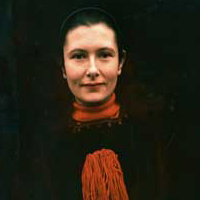O Taste and See by Denise Levertov: Summary and Analysis
O Taste and See by Denise Levertov is a short poem that depicts the real ways to live the life to the fullest and enjoy the every moment of life the way it comes to us. Reversing the allusion of Wordsworth sonnet ‘the world is too much with us’ the speaker argues that the world is not enough with us only because the life we have today is uncertain and we need to cross the street and die one day. Death is inevitable and we have to give up this life at any cost.

Denise Levertov (1923-1997)
But god has given everything to us. He is kind, benevolent of all loving so he has given us the abundance. God has kindly placed us in the garden. We may be hungry in the garden where the fruits are hanging. We will not realize the kindness of the god until we ourselves go and pluck the fruit. We need the effort, courage and dedication to realize the god’s goodness. Using the biblical allusion, she conveys the message that we have to taste and see the goodness of God. Nothing can be achieved without the human labor.
In the first stanza the speaker states that the world is not enough with us which suggest that the time in our life is very short, therefore we cannot sit back and just observe the world, we need to experience the world and for this we have to taste each and every flavor of life and see the each variant color that life gives to us. The second stanza presents the speaker in the subway where he notices the Biblical verse, Psalm 34:8 ‘O taste and see that the Lord is good.’ The verse directly says that the almighty God is good and to experience his goodness one has to totally submit himself to the life god has given. One has to feel the beauty and wonder of the surroundings with his/her all senses. The world has so many things to offer to us and we need to open our eyes and arms to receive them.
In the next stanza, there are the list of things that represents the various aspects of life; grief, mercy, language, tangerine, and weather. These sets of words almost cover all the aspects of human life. God has given grief which obvious in human life when there is no fulfillment of expectations. Mercy is another form of god. Language is the boon of God that we have got to express our feeling, sorrow, pleasures, gratitude and dissatisfaction. The most important imagery is tangerine and weather. Tangerine is the symbol of our life. Its cover is hard to peel and bitter in taste, but if we manage to have patience and take off the peel then the fruit is certainly sweet and delicious. Life is also same in this respect. It is full of hardships and bitter experiences, but we need to accept life with its hardships and bitterness and have to face it patiently and one day certainly we will receive and experience the real happiness of life. She presents life as a tangerine whose hard cover we have to peel to taste its sweetness. Grief may be life’s hard cover of tangerine which we must peel away to enjoy the warmth of life. Levertov is convinced of the fact that tangerine can be tasted only in this life. Once you cross the street of this life, tasting tangerine is not possible. Then, god can be experienced or felt within this life but not beyond.
The weather is another metaphor for life. The weather is uncertain and it has spring and winter, rain and sun. Life is also rich in extreme cold, heavy rain, scorching sun and at the same time pleasant spring. We have to enjoy each weather of life to fully experience the real goodness of Life and God. Life is the process of breathe, bite, savor, chew, swallow, and transform. Transform here means to change the form of life into death.
In verse four and five, the death is shown very close to us as the next side of the street. The central idea of shortness of life is projected here. Death can reach to us anytime, so it is wise to enjoy every moment of life without any regret and complaint. We have to satisfy our hunger of life and for this we ourselves have to be active. The orchard metaphorically stands for the life and fruits refers to the every kind of fruits; bitter, sour, sweet, ripe, unripe, rotten. Life has everything to offer that we ever want. If we die we cannot taste all the fruits of life. So, while living we have to taste all the experiences of life and see the all the beauty of the world. No one can say what will happen after death. That is why the poet is focusing to enjoy life while living. Every experience of happiness, sadness, and frustrations are precious. We have to accept life as it comes to us to enjoy it to the fullest is the main theme of the poem.
